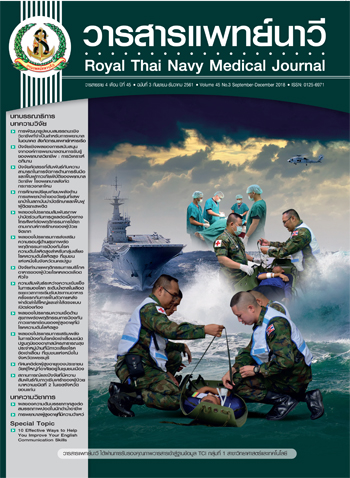Consequences of Nursing Organizational Support as Perceived by Professional Nurses : A Meta-Analysis
Main Article Content
Abstract
The aims of this research synthesis were to analyze research characteristics, analyze variances among research characteristics and study the standard indices of the consequences of nursing organizational support by using the meta-analysis technique. In all, 25 Thai studies conducted during 1999 - 2015 were recruited for the analysis. The instruments used in the study were a study-selection form and a data collection form. The instruments passed content validity testing by a panel of five qualified experts. All of the data were analyzed by using the meta-analysis method of Glass, McGaw and Smith, which obtained 26 standard indices. Data were analyzing by using the Random Effects Model - R program analysis. The findings were as follows :
1. Characteristics of researches, in terms of general characteristics. The majority of the studies was composed of master’s thesis dissertations produced by various universities nationwide. Most had been published by the Faculty of Nursing, Chulalongkorn University. Most of the studies (17 studies; 68%) were published in the field of nursing administration and published during 2002 - 2006 (10 studies; 40%). In terms of research content, most of the sample group was composed of registered nurses in 24 studies (96%). Furthermore,
the majority of sample sources in this study was in Bangkok and its surrounding provinces for 14 studies (56%). On research methodology, most of the studies were found to be based on correlational research designs (21 studies; 84%), and most of the research quality was high (13 studies; 52%).
2. Analysis of variances among research characteristics revealed the research methodology’s sampling variables to have caused mean standard indices to differ with statistical significance at .05.
3. The meta-analysis results showed team level to have the highest mean index standard (r = .576) in the areas of nursing team effectiveness (r = .576), followed by the organization level (r = .542) such as learning organization (r = .693) and the individual level (r = .521) such as leader-member exchanges (r = .973).
Article Details

This work is licensed under a Creative Commons Attribution-NonCommercial-NoDerivatives 4.0 International License.
References
Srisatitnarakul B. Leadership and strategic management in nusing organization for the 21th Century. Bangkok: Chulalongkorn University Press; 2007. (in Thai).
Srisuphan W, Sawaengdee K. Recommended policy-based solutions to shortage of registered nurses in Thailand. Thai Journal of Nursing Council 2012;27(1):5-12. (in Thai).
Vittayasuporn C. Nursing crisis and challenges in Thailand for AEC. Bangkokbiz News. 2012;p.27. (in Thai).
Tangchatchai B, Siritarungsri B, Sripunworasakul S, Rungkawat V. Factors predicting job retention of professional nurses at the northeast regional hospitals, Ministry of Public Health. Thai Journal of Nursing Council 2011;26(4):43-54. (in Thai).
Wiratchai N. A Meta – analysis. Bangkok : Chulalongkorn University Press ; 1999. (in Thai).
Glass GV, McGaw B, Smith ML. Meta-analysis in social research. Beverly Hills: Sage Publication; 1987.
Wiratchai N, Wongvanich S. A. synthesis of research in education using meta-analysis and content analysis. Bangkok : Printing and binding Charoenphol; 1998. (in Thai).
Wiratchai N, Ruengtragul A, Jetchamnongnuch W, Pornprasertmanit S, Kedcham A, Pranompont S, et.al. The report examines the research on quality education Thailand : meta-analysis. Bangkok: Chulalongkorn University ; 2009. (in Thai).
Eisenberger R, Hunyington R. Perceived organizational support. Journal of Applied Psychology. 1986;71(3):500-7.
Kongyoo S. A meta-analysis on antecedent variables of nurses’ quality of working life. [Master’s Thesis, Faculty of Nursing]. Chulalongkorn University ; 2014. (in Thai).
Cooper H, and Hedges LV. The handbook of research synthesis. New York: Russel Sage; 1994.
Ioannidis PA, Trikalions AT. An exploratory test for an excess of significant findings. Clinical Trials 2007;(4)3:243-53.
Brown R, Condor S, Mathews A, Wade G, Williams J. Explaining intergroup differentiation in an industrial organization. Journal of Occupational Psychology. 1986;59(4):273-86.
Wichagarn R. An analysis of master theses in nursing in Thailand from academic year 1974 to 1984. [Master’s Thesis, Faculty of Education]. Chulalongkorn University ; 1987. (in Thai).
Khunthar A, Kedcham D, Sawaengdee K, Theerawit T. Job transfers amongst registered nurses in Thailand. Thai Journal of Nursing Council 2013;28(3):19-31. (in Thai).
Srisatitnarakul B. The methodology in nursing research. 3rd ed. Bangkok : Chulalongkorn University Press; 2004. (in Thai).
Vanitbuncha K. Statistical Analysis for Decisions. 4th ed. Bangkok : Chulalongkorn University Press; 1999. (in Thai).
Jeenkool P. Relationships between personal factors, achievement motivation, organizational support, and career success of professional nurses, govermental university hospitals. [Master’s Thesis, Faculty of Nursing]. Chulalongkorn University; 2004. (in Thai).
Panuwatsuk M. Relationships between working factors, participative leadership of head nurse, organizational support, and job satisfaction of staff nurses, hospitals under the jurisdiction of the Department of Medical Services, Bangkok Metropolitan Administration. [Master’s Thesis, Faculty of Nursing]. Chulalongkorn University; 2003.
(in Thai).


